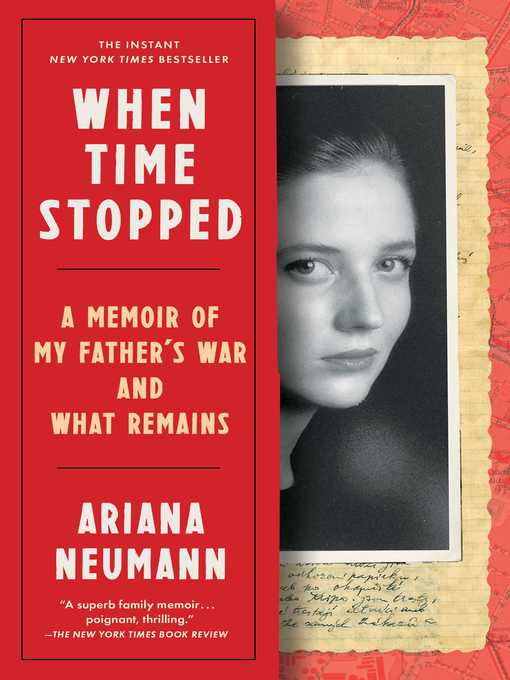
When Time Stopped
A Memoir of My Father's War and What Remains
کتاب های مرتبط
- اطلاعات
- نقد و بررسی
- دیدگاه کاربران
نقد و بررسی

December 1, 2019
Venezuelan-born journalist Neumann (Venezuela's The Daily Journal) explores her father's life in this debut. Growing up, she knew her father was different, but was told very few details of his past--not even that he was Jewish. Born in 1921 in Prague, the son of a paint factory owner, Hans Neumann came of age during a time of severe anti-Semitism. With the help of non-Jewish friends, he went to Berlin with forged documents and a non-Jewish persona, where his engineering background and industrial knowledge were useful to a company that manufactured paints for Nazi military projects. After the war, he and his brother moved to Venezuela, becoming successful entrepreneurs but rarely speaking of their past. Hans left his daughter a cache of documents detailing his wartime odyssey, which she discovered after his death. With determination and the help of translators, genealogists, historians, and family members, she reconstructs her father's astonishing story of survival. VERDICT Neumann's eloquent, skillfully researched book will appeal to many, especially those interested in family histories and the lives of Holocaust survivors.--Laurie Unger Skinner, Highland Park P.L., IL
Copyright 2019 Library Journal, LLC Used with permission.

December 16, 2019
Neumann, a former foreign correspondent for Venezuela’s Daily Journal, debuts with a deeply moving account of her father’s life during the Holocaust. Growing up as a girl of privilege in Caracas, Venezuela, Neumann formed a Nancy Drew–type sleuthing club with friends. By accident, she came across a box containing papers and other documents for a man named Jan Sebesta, but with a photo of her father, Hans. Soon, though, the box disappeared. It would be decades before Neumann rediscovered the photo, and it proved to be the springboard for a spy-worthy story of her now-deceased father surviving the Holocaust by living in plain sight in Berlin under an assumed identity. By poring over letters sent to her father from Terezin, a Nazi concentration camp near Prague, Neumann learns that of 34 members of the Neumann family living in Czechoslovakia during WWII, 25 were killed by the Nazis. Using the letters—as well as those written by her father—she searches for and meets cousins she didn’t know existed, who help fill in details, such as that her “father was a valued member of the fire brigade” in 1944. This gripping, expertly researched narrative will inspire those looking to uncover their own family histories. (Feb.)Correction: An earlier version of this review incorrectly stated the author's mother hid the box containing documents the author found as a child.

January 15, 2020
A London-based former foreign correspondent for Venezuela's Daily Journal uncovers the true story of her Jewish father's double life during World War II. When he learned that he was scheduled to be deported from Nazi-occupied Prague to a concentration camp, Hans Neumann took a brazen step: He hid in plain sight, assuming a false identity and going to work as a chemist for a supplier of the German war machine in Berlin. That daring feat alone might make his story unique, but there is much more to it. After the war--during which his parents and 23 other relatives were murdered by the Nazis--Neumann settled in Caracas, and he and his brother founded a paint company that became an international conglomerate. He and his glamorous second wife attained an enviable position in Venezuela: rich, cultured, well respected, and socially prominent. Neumann hid his Jewish roots, but the author, the couple's only daughter, found an early clue to his erstwhile double identity when she stumbled as a girl on the fake ID card that had enabled him to work in Germany. Even then, she had no idea he was Jewish--"I was absolutely oblivious as a child"--and remained largely in the dark until her father died and left her a box of papers that held a memoir of his bold escape to Berlin. In this elegantly structured debut, the author reconstructs with considerable literary finesse the life of her father, who owned 297 pocket watches--a unifying motif and organizing metaphor that readers may see as his metaphorical attempt to replace time stolen by Hitler. She also offers vivid images of Terezín (renamed Theresienstadt by the Nazis), where her grandparents were interned before they died in Auschwitz. Because Terezín was nominally a transit and labor camp rather than a death camp, prisoners could send and receive letters and packages, and the author includes poignant excerpts of some of the letters. A multilayered memoir written from the unusual perspective of a Holocaust survivor's daughter who grew up in Latin America.
COPYRIGHT(2020) Kirkus Reviews, ALL RIGHTS RESERVED.

Starred review from December 1, 2019
After Neumann's father passed away in 2001, the author discovered a mystery while going through his belongings: an identification card of his, but in a name she did not recognize. And so began a decades-long quest for the truth of her family's history, in which she discovered stories of her Czech Jewish ancestors' bravery amid the horrors of the Nazi regime. A box of her father's letters, documents, written accounts, and other memorabilia led Neumann to more boxes, more family, and more letters from which she, with the help of a Czech researcher and translator, pieced together this profound, gripping, and gut-wrenching memoir. Letters from her grandparents, who were transported to Theresienstadt and in their faith and optimism remained steadfastly strong for their family, are especially powerful. Neumann describes scenes of Bubny Station, Kristallnacht, and life in the concentration camps with utterly painstaking detail, placing readers there. She learns about the past her father kept hidden from her throughout his lifetime. This heartbreaking and unforgettable memoir belongs in every library for the important history Neumann unearths. Like Anne Frank's diary, it offers a story that needs to be told and heard.(Reprinted with permission of Booklist, copyright 2019, American Library Association.)

























دیدگاه کاربران